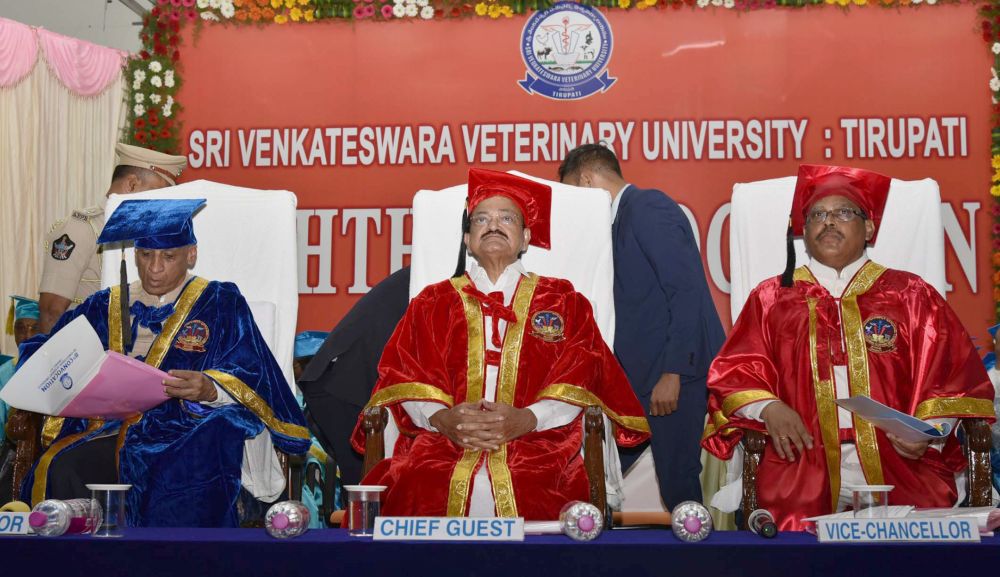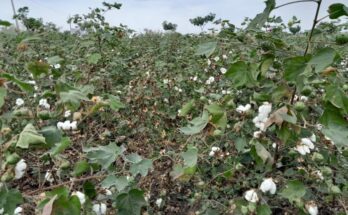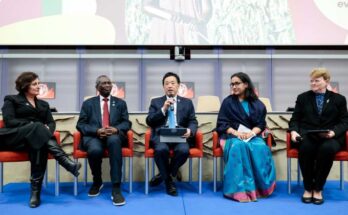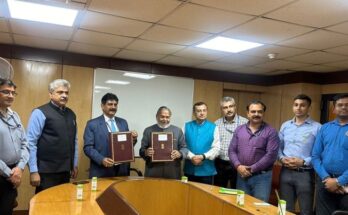Vice President of India, M. Venkaiah Naidu has stressed the need to promote integrated farming practices to improve the productivity of livestock and double farmers’ income.
Delivering the 8th convocation address at Sri Venkateswara Veterinary University, in Tirupati today, Naidu said that animal husbandry was vital for ensuring a more inclusive and sustainable agriculture system.
Referring to a study, Naidu said that there were no suicides in families of farmers who diversified into allied activities like poultry, dairy or aquaculture. He observed that farming households with livestock would be able to better withstand distress caused due to extreme weather conditions and crop failures.
Quoting NSSO statistics, the Vice President said that rural India had an estimated 90.2 million agricultural households and facilitating sustainable income for all these households must be the primary endeavour for everyone.
The Vice President said that a healthy and robust agriculture sector was an important prerequisite to ensure sustainable and inclusive growth in India. He called for measures to make farming a lucrative career opportunity, especially for the youth, by making agriculture economically viable and financially rewarding.
Saying that agriculture industry contributes 17 percent of India’s total GDP, out of which, the 27 percent comes from animal husbandry and overall, the dairy, poultry and aqua industries contribute 4.4 percent to the nation’s GDP, the Vice President said that these numbers signify the crucial role played by these sectors in our economy.
Opining that livestock was integral to peoples’ lives and cattle wealth was crucial component of human existence, Naidu said that it was the duty of every citizen to protect the precious national wealth.
Observing that the rural economy was dependent on agriculture and its allied sectors such as poultry, dairy and others, Naidu said that the sector provides gainful employment to a large number of youngsters from rural areas. Naidu urged upon universities to encourage research on veterinary sciences.
The Vice President urged the government, agriculture scientists and Krishi Vigyana Kendras (KVKs) to encourage farmers to diversify into allied services for financial stability. He opined that ensuring food security was crucial for India to harvest the dividend from its demographical advantage.
Naidu said that poultry, fisheries, sericulture, and other services have great potential to contribute towards employment and economic growth. He also stressed the need to conserve and improve the productivity of our indigenous breeds.
He urged universities to continuously collaborate with each other and develop linkages with industries to develop human resource, augment technology and find solutions to problems faced by the farmers.
Expressing concern over the mismatch in supply and demand of veterinary manpower in India, Naidu tasked authorities to fill vacant positions in academic, R&D, extension and field institutions to serve the needs of farmers. He wanted all veterinary and agricultural universities to have engineering and IT departments to make use of the endless possibilities of technology in general and Information and Communication Technology (ICT) in particular.
Naidu said the hallmark of Indian ethos has been the great reverence for nature and animals and the diverse flora and fauna were considered manifestations of the single divine principle pervading the entire universe. He opined that there could not be a more eloquent testimony of India’s commitment to preserving the planet’s biodiversity than its ancient Indian epics and rich iconography.
“This world view of ours was based on a symbiotic relationship between humanity and nature. It is this perspective that can make us realise sustainable development goals we have set for ourselves as a world community,” he said.
Later the Vice President visited the Veterinary Pathology Museum maintained by the Department of Pathology and appreciated the efforts of the university for setting up one of India’s best facility. He said that the museum would give great exposure to students and researchers of veterinary pathology.
The museum houses more than 500 specimens of animal diseases and is being preserved since 1960. The museum also has a display of eminent scientists and milestones of medical history from around the world.
Integrated farming needed to increase productivity of livestock: Vice President

Delivering the 8th convocation address at Sri Venkateswara Veterinary University, in Tirupati today, Vice President of India, M. Venkaiah Naidu said that animal husbandry was vital for ensuring a more inclusive and sustainable agriculture system




